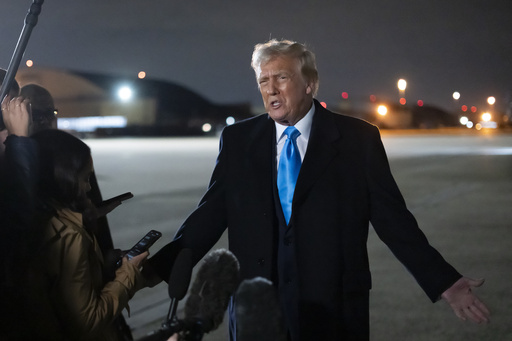PALM BEACH, Fla. — President Donald Trump indicated on Sunday that the American populace might experience certain difficulties due to the escalating trade conflict resulting from the tariffs he imposed on Canada, Mexico, and China. He asserted that without its favorable trade balance with the United States, Canada would “cease to exist.”
On Saturday, Trump formalized the trade penalties during his time at a resort in Florida, prompting a mixed response characterized by panic, anger, and uncertainty. These actions threaten to disrupt a long-standing trade partnership in North America while further straining relationships with China.
After returning from Florida, Trump hinted at the potential for even higher tariffs on other nations, emphasizing that these import taxes are “definitely happening” with the European Union and possibly the UK as well. He dismissed concerns about retaliatory actions from Canada, stating, “If they want to play the game, I don’t mind. We can play the game all they want.” Trump also mentioned plans to discuss these issues with the leaders of Canada and Mexico the following day.
By enacting these tariffs, Trump may have contradicted a previous commitment made to the electorate during last year’s campaigns, which was to promptly reduce inflation. The burgeoning frustration among other countries may also echo domestically among consumers and businesses as they feel the repercussions of these trade measures.
“WILL THERE BE SOME PAIN? YES, MAYBE (AND MAYBE NOT!),” Trump expressed on social media. “BUT WE WILL MAKE AMERICA GREAT AGAIN, AND IT WILL ALL BE WORTH THE PRICE THAT MUST BE PAID.” The specifics regarding what conditions must be fulfilled to cease the tariffs, which Trump cited as initiated by an economic emergency, remain unclear. However, he underscored that eliminating trade deficits with Canada and Mexico is imperative to revoke these tariffs.
He attempted to clarify his earlier statement about potential inflation, noting, “We may have in the short term, a little pain, and people understand that. But long term, the United States has been ripped off by virtually every country in the world.” The tariffs are expected to take effect on Tuesday, leading to confusion as Kirsten Hillman, Canada’s U.S. ambassador, expressed her country’s bewilderment, stating, “we view ourselves as your neighbor, your closest friend, your ally.”
In his posts, Trump specifically targeted Canada, which has begun retaliatory actions. He is imposing a 25% tax on Canadian goods and a 10% tariff on oil, natural gas, and electricity, while Canada is responding with its own set of tariffs on U.S. products totaling over $105 billion. These include items like alcohol and fruit, indicating a significant escalation in trade tensions.
Despite Trump’s assertions that the U.S. can thrive without Canada, it’s worth noting that approximately 25% of America’s daily oil consumption comes from Canada. He maintained a misleading view that the U.S. subsidizes Canada via a trade imbalance, particularly due to energy exports. Trump claimed that without this surplus, “Canada ceases to exist as a viable Country,” adding that Canada might benefit from becoming the “Cherished 51st State” of the U.S. to enjoy “much lower taxes and far better military protection.”
Prime Minister Justin Trudeau has encouraged Canadians to purchase more domestic goods, asserting that Trump’s tariffs will result in discomfort across North America, given that a large portion of Canada’s exports are directed toward the U.S. The initial focus of Canadian tariffs will be on alcohol, cosmetics, and paper products, followed by a broader range of goods in subsequent measures, including automotive and agricultural products.
Mexico’s president, Claudia Sheinbaum, proclaimed new tariffs and urged the U.S. to address drug addiction issues internally. Following Trump’s announcement, she and Trudeau emphasized strengthening the bilateral ties between Canada and Mexico.
The Chinese government has declared its intent to safeguard its economic interests, planning to take legal action through the World Trade Organization. For Trump, the critical factor remains whether inflation could evolve into a political liability forcing him to reconsider his stance. As a candidate, he often criticized Democrats for inflation trends during President Joe Biden’s term, which he attributed to pandemic supply chain issues and global crises.
Trump claimed that his previous presidency was marked by low inflation and suggested the public should anticipate similar outcomes if he returns to power. However, he also acknowledged that rising inflation could severely impact the nation, a position he now seems to be hedging by contemplating further tariffs.
While no specific timeline for additional tariffs was disclosed, Trump indicated they would be imposed “pretty soon” on the EU, which includes many U.S. allies. Larry Summers, former treasury secretary under Clinton, condemned the tariffs as damaging to the American economy, outlining that bullying in both playground scenarios and international relations is ultimately not a sustainable strategy.
Analysis suggests that Trump’s tariffs may counteract the intended positive economic effects for his voter base. Research from Yale indicates that if the tariffs persist, the average American household might face a loss of approximately $1,245 this year, paralleling a more significant tax increase spread over the next decade.
Goldman Sachs reiterated on Sunday that the tariffs are set to take effect on Tuesday, but while a last-minute resolution remains a possibility, they foresee that the tariffs could be temporary, leaving the economic outlook ambiguous.



